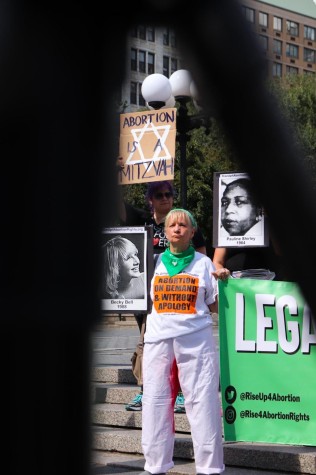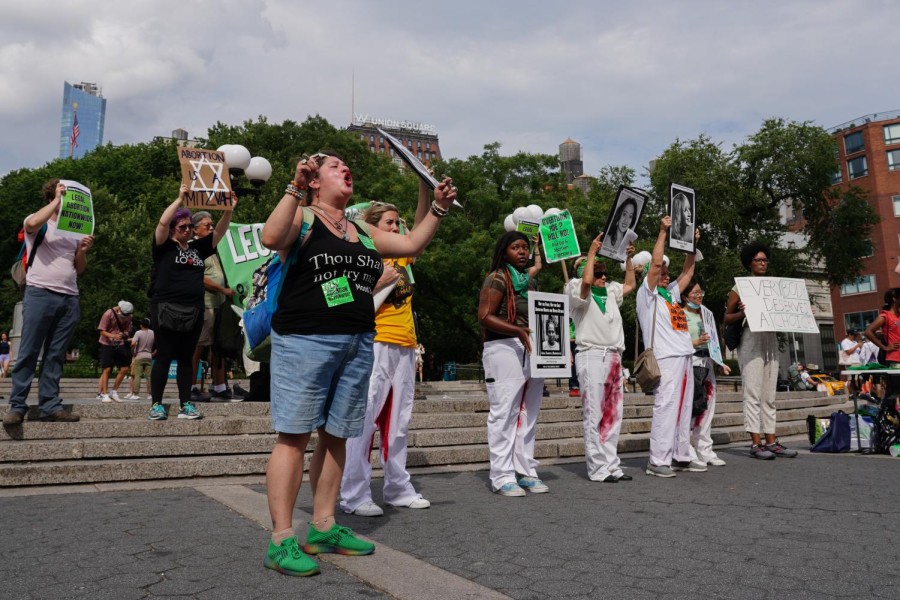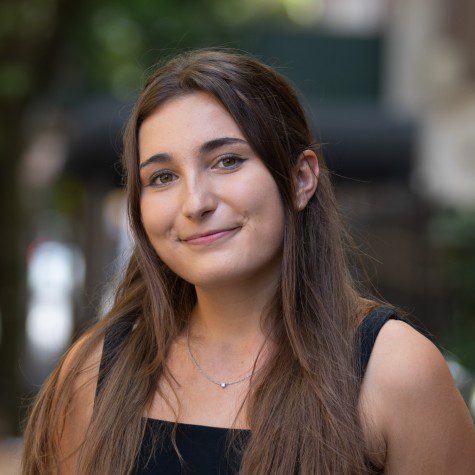Controversial abortion rights group stages ‘die-in’ at Union Sq.
Rise Up 4 Abortion Rights, a reproductive rights group that has faced criticism from other grassroots organizations, held a protest to make abortion legal nationwide on Labor Day.
The controversial reproductive rights advocacy group Rise Up 4 Abortion Rights staged a protest in Union Square on Labor Day. The protest comes in reaction to the Supreme Court’s decision to overturn federal protection on reproductive rights. (Qianshan Weng for WSN)
September 7, 2022
Abortion activists, many of whom wore white pants stained with fake blood, staged a “die-in” at Union Square on Labor Day to call for legal abortion across the United States. The protest, led by the contentious reproductive rights advocacy group Rise Up 4 Abortion Rights, concluded as approximately a dozen participants laid down in the middle of the square for a moment of silence — a display meant to represent the lives lost to abortion bans and restrictions.
“We want to bring to people the reality that when abortion is illegal, women die,” Travis Morales, an organizer with Rise Up 4 Abortion Rights, announced to the crowd of protesters.
Rise Up 4 Abortion Rights was launched in early 2022 when activists Merle Hoffman, Lori Sokol, Sunsara Taylor and others started to suspect that the U.S. Supreme Court would revoke the federal right to an abortion, as it eventually did by overturning Roe v. Wade on June 24. The organization has since led several protests, including a demonstration on International Women’s Day on March 8 and at a WNBA game on June 8 — when topless protesters charged the court. It also held protests in Philadelphia, Chicago and Washington, D.C. on Monday, Sept. 5.
Since the leaking of Supreme Court Justice Samuel Alito’s draft decision on May 2, which indicated the court’s majority decision to overturn Roe v. Wade, Rise Up 4 Abortion Rights has increased its presence locally and nationally. The group calls for “continuing, sustained, nonviolent mass protest,” according to its founding statement.
The organization was publicly denounced by a coalition of 23 grassroots human rights organizations, including NYC for Abortion Rights, the Reproductive Justice Collective and United Against Racism & Fascism NYC in a collective statement published in June. The statement accuses Rise Up 4 Abortion Rights of diverting money from social justice causes and promoting racism and transphobia.
“Our movement needs to be strong and united,” the statement reads. “Most repro groups have turned their backs on RiseUp privately since their inception. It is vital for all repro groups to now unite in discrediting RiseUp publicly.”
The statement also explains that the group — specifically Taylor, one of its founders — has ties to the Revolutionary Communist Party, which critics have called a “cult of personality.” The party has since rejected that label.
On June 27, Rise Up 4 Abortion Rights released a statement in response, signed by all three founders. The organization denounces the “highly destructive and divisive attacks” that it has faced, and states that it hasn’t used funds for any purpose that wasn’t made clear to donors. The statement then urges those who have criticized the organization to put their efforts toward protesting the reversal of Roe v. Wade.
“We urge people to focus their efforts on struggling to reverse this attack on the fundamental right to abortion and not squander precious time and unity lamenting unprincipled attacks on groups and individuals that have been fighting for abortion rights and providing abortion care for years,” the statement reads.
Morales, the Labor Day rally’s leader, kicked off the protest by leading participants in chants, including “Without this basic right, women can’t be free” and “abortion on demand and without apology.” He then prompted about a dozen Rise Up 4 Abortion Rights volunteers to share stories of women who have lost their lives due to unsafe abortions. One of the volunteers told participants about the death of Savita Halappanavar, a dentist in Ireland who was denied an abortion in 2012, despite having been told by doctors that her unborn baby would not survive.
Since Roe v. Wade was overturned, at least 12 states have banned most abortions. Two other states — Ohio and Georgia — have banned abortion after six weeks of pregnancy. Experts have said that more women will be at risk for negative health consequences, and more women will die as a result of these bans.

“I don’t think we can overstate how dangerous this is and what a violent action it is to tell us that we don’t have the right to our own bodies and to make choices for ourselves,” Emma Pinsky, a Rise Up 4 Abortion Rights volunteer, said. “We can’t just expect that business as usual is going to fix this because business as usual is what got us here.”
Pinsky handed out flyers at the rally and wore overalls — bright green, to symbolize abortion rights. She said that although abortion rights are currently the organization’s main focus, the group also advocates for other aspects of reproductive justice, including access to contraception and the right to maternity leave. She added that even those who live in Democratic majority states — and therefore may not be directly impacted by Roe v. Wade’s reversal — are still responsible to stand up for those who are most affected.
“We have a huge responsibility in states like New York — if it’s not affecting us, we still need to recognize that what happens to one of us happens to all of us,” Pinsky said. “You can really only judge a society by the way it treats its most vulnerable members.”
Emma Kaplan, another volunteer with Rise Up 4 Abortion Rights, attended the protest and urged advocates of abortion rights in the United States to mimic the green wave movement, which began in Argentina and is often marked by green bandanas. The movement, which began in the early 2000s, quickly gained traction as organizers fought to increase safe access to abortion across Latin America. Its efforts contributed to the legalization of abortion in Argentina in 2020 and the 2022 decriminalization of the procedure in Colombia.
“Out of this really nasty future that they’re driving, there is also the potential for something different, for a green wave for people who are sickened by this,” said Kaplan, who is also a member of the New York City Revolution Club, an organization that advocates for a national communist revolution. “They came out in the millions in such a power that they legalized abortion. And that’s what we have to do here. If we did that, Joe Biden would make abortion legal nationwide as quickly as he waived those student loans, if we had that kind of an upsurge.”
Isabella Tapia contributed reporting. Contact Abby Wilson at [email protected].

























































































































































